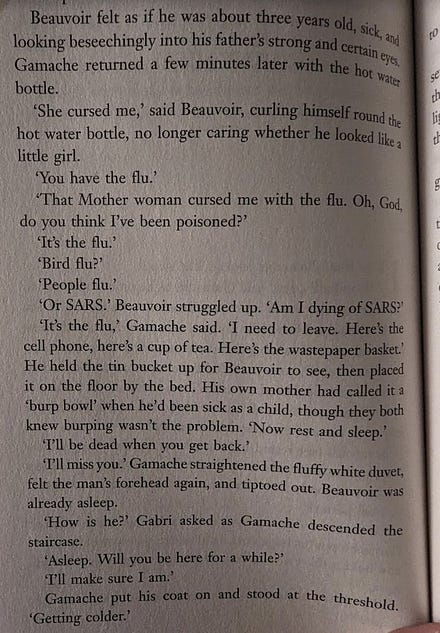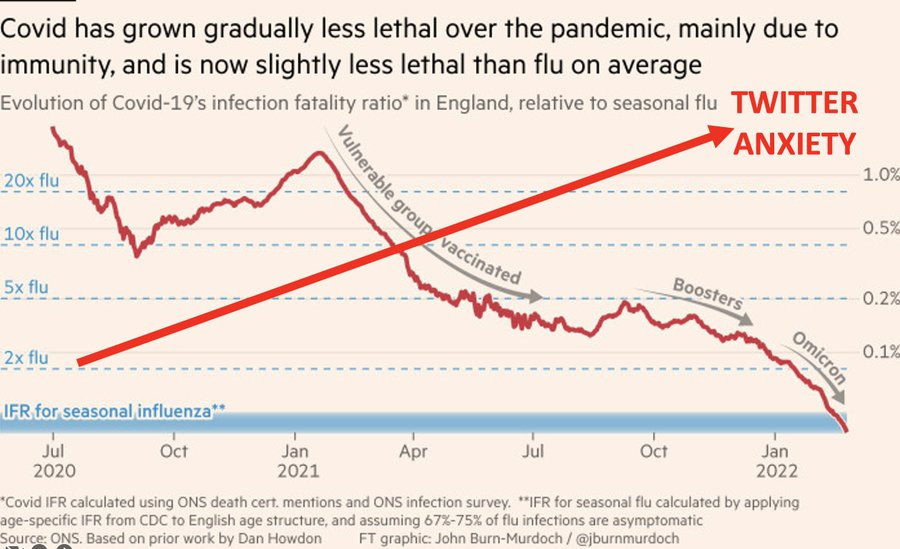We are soon going to treat COVID19 the way we treated the flu in 2007, as part of life
October 16 | Posted by mrossol | Coronavirus, HealthSource: We are soon going to treat COVID19 the way we treated the flu in 2007, as part of life
|
|
Recently, I was reading a novel from 2007. Beauvoir came down with the flu, and Gamache helped him to bed. Check it out…
The passage is amazing. No mask. No hepa filter, and no sealing the door shut with saran wrap. No corti-rosenthal box, and no long twitter thread by Beauvoir, “Even though I did everything right…..”
Gamache does not worry one bit about himself, and he is also confident his colleague will recover. This is how we treated the flu in 2007, and how we will once again treat the flu and covid in 2027.
Why?
Human beings have long recognized that respiratory viruses are highly contagious. Moreover, they change such that they are capable of re-infecting those who were already infected. You can get the flu many times in your long life.
Human beings also know that once you get one version of the flu, you will be protected against that version and similar versions for some time. Such is life.
Human beings intuitively get that no matter how safe you are in 1 situation—Gamache could wear a hazmat suit with Beauvoir— he will soon be in a bar, or train-station or restaurant, and exposure to the circulating flu is guaranteed. Probably all he can do is stay warm, stay rested, improve his diet and exercise, and focus on life— in this case, catching the killer!
COVID19 is the same thing. Most Americans have had COVID. Despite ruining the lives of American children 90% got it anyway, and most got it without vaccination beforehand. Americans intuitively understand where we are now, and most have returned to totally normally life, but a few do not get it.
They still saran wrap their spouse in a room if one gets COVID, and post approvingly of it on social media. This is illogical. First, it is unclear if these draconian in home interventions work. Are they less likely to get covid in the short term? (no study exists)
And second, it belies the fact that no one— who interacts with others— can control all the environments one visits. You will just get it in Bistro (Gamache’s preferred haunt) or the B&B (Gamache), even if you avoid it in the bedroom.
In the next 10 years, no one will retrofit every building on earth with HEPA filters or whatever other unproven (i.e. no RCT) ventilatory measure one wants. You will not be able to control all environments, and even if you were, these viruses are so contagious that with repeat exposures you will very likely get sick again anyway.
If you lose when you roll a 6 sided dice and get a 1, you will lose less often if you make that an 8 sided dice. But if you have to roll a thousand times a day, you will definitely lose. Even intervention that decrease risk of getting COVID (and let’s be clear most have no good data) would at best work this way. You will still get COVID many times over.
Knowing that, we evolved to be like Gamache. He cares about his friend, he tucks him him, but he has work to do, so he has to go. He is not worried about his health, and he is sure the friend will recover with some rest.
COVID19 once had an IFR that was concerning, particularly in the elderly, but now it is in flu territory. Our response will return to the way we handled flu in 2007 with compassion and not terror. Except for 5% of people trapped on social media whose anxiety knows no bounds. They may be saran wrapping their spouses in their room as we speak.
You’re a free subscriber to Vinay Prasad’s Observations and Thoughts. For the full experience, become a paid subscriber.







Leave a Reply
You must be logged in to post a comment.